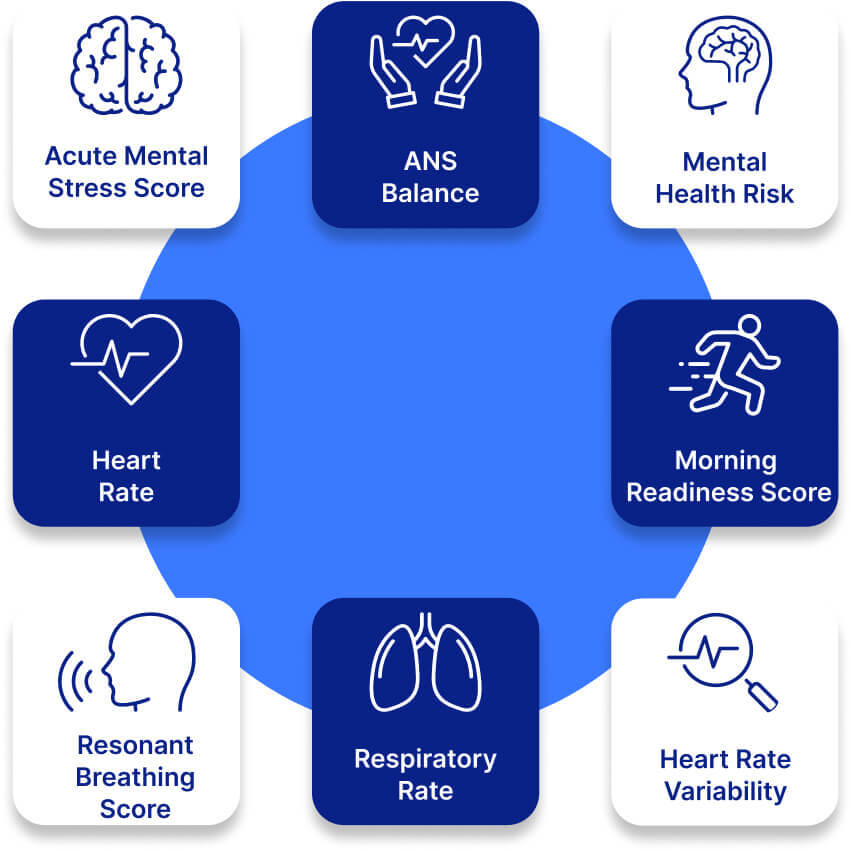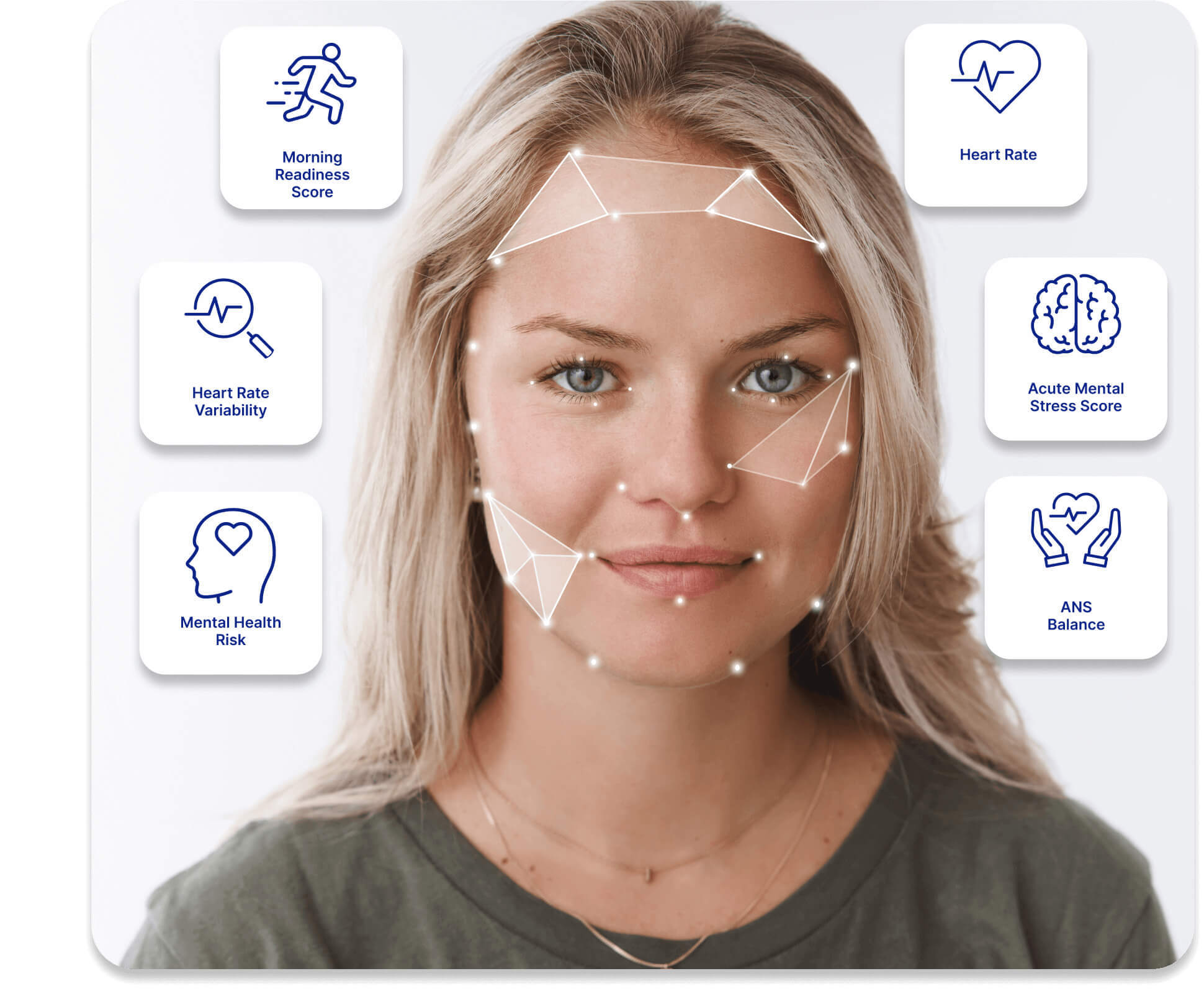In this blog post, we explore how biomarkers can be used to assess and understand mental health. Biomarkers are measurable indicators of biological processes in our body. They are invaluable tools in evaluating diseases, responses to treatments, and even mental health conditions. Biomarkers allow professionals to gain insights from a patient and provide valuable information for personalised care and treatment plans. While we often associate biomarkers with physical illness, it is crucial to recognise their relevance in assessing mental well-being as well. In fact, specific biomarkers can provide valuable insights into mental health conditions such as stress, anxiety, insomnia, burnout and depression.

What are biomarkers?
Biomarkers, also known as biological markers, are measurable indicators or characteristics that can be used to assess biological processes, physiological conditions, or disease states in living organisms. These markers can be found in various biological materials such as blood, urine, saliva, tissues, and even genetic material like DNA.
Biomarkers serve as objective and quantifiable measurements that can help in diagnosing diseases, monitoring disease progression, predicting treatment response, and evaluating the effectiveness of interventions or therapies.
Digital biomarkers are a specific type of biomarker that refers to data collected from digital devices or technologies to monitor, measure, and analyse various physiological, behavioural, or cognitive characteristics of individuals. These digital biomarkers are generated through the use of smartphones, wearables, smartwatches, fitness trackers, sensors, or other digital health technologies.
The Autonomic Nervous System
To understand the relationship between biomarkers and mental health, we must delve into the function of our nervous system. Our nervous system consists of two divisions, the central system involving the brain and spinal cord and the peripheral system consisting of the autonomic and somatic nervous systems. The autonomic nervous system (ANS) is responsible for regulating involuntary bodily functions such as cardiac functions and breathing. It consists of two primary divisions: the sympathetic nervous system (SNS) and the parasympathetic nervous system (PNS).
The SNS, often referred to as the “fight or flight” response, plays a crucial role in mobilising the body for action, particularly in response to stress or perceived threats. When the SNS is activated, it triggers the release of hormones such as adrenaline and cortisol. This results in increased heart rate, reduced heart rate variability (HRV), vasodilation (widening of blood vessels) in critical areas such as muscles, and vasoconstriction (narrowing of blood vessels) in the digestive system and skin. These physiological changes prepare the body for immediate action.
In contrast to the SNS, the PNS supports restorative processes, conserves energy, and maintains bodily functions during non-stressful periods. It promotes relaxation and digestion. The PNS helps to lower respiratory and heart rates and increases HRV. This contributes to the body’s repair, and overall well-being.

Although stress has a psychological origin, it affects several physiological processes in the human body. When a person is exposed to a stressor, the ANS system is triggered: the parasympathetic nervous system is suppressed and the sympathetic nervous system is activated. This results in the secretion of the hormones epinephrine and norepinephrine into the blood stream which leads to, for example, vasoconstriction of blood vessels, increased blood pressure, increased muscle tension and a change in heart rate (HR) and heart rate variability (HRV).
The ANS therefore serves as a powerful indicator of the balance between recovery and physiological stress (both physical and mental). It helps the user better understand the current state of the body and determine the best course of action towards reaching certain goals without working against yourself. Healthcare solutions can use this biomarker to guide the user during its digital journey, which is one of the key challenges in digital mental healthcare.
HRV as an objective mental health fingerprint
A key biomarker that plays a significant role in mental health is heart rate variability (HRV). HRV refers to the variations in time intervals between consecutive heartbeats. It serves as one of the best related indicators of the balance between the sympathetic and parasympathetic nervous systems of the ANS. It is widely considered as one of the best objective metrics for physical fitness and determining your body’s readiness to perform.
The intimate connection between the heart and the brain is well described. HRV is known to be regulated by the prefrontal cortex (i.e. brain regions involved in the regulation of ANS activity), is considered to indirectly reflect complex patterns of brain activation and provides information on the central nervous system (CNS) functional organisation and the bidirectional interaction between the CNS and the ANS.
There is substantial evidence that HRV is not only a risk marker for cardiovascular disease, but that also decreases in HRV have close associations with depression, schizophrenia, and post-traumatic stress disorder. On the other hand, high HRV is generally associated with a relaxed and resilient mental state.
Heart rate variability (HRV) can be derived from a ECG or PPG signal. A commonly used statistical metric for representing short-time HRV (over a time duration of the order of 10s to 1 min) is the Standard Deviation of NN intervals (SDNN).
Mental biomarkers and insights

Mental healthcare is a multi-modal pursuit and biomarkers act as one valuable component of a comprehensive assessment. Biomarkers within an online healthcare platform or solution are the starting point of personalised user feedback: detect underlying issues through a short questionnaire, connect with a therapist or other healthcare provider, recommend stress management modules and/or guide the user to relevant platform content/offerings.
Objective mental biomarkers offer healthcare solutions the possibility to go beyond subjective questionnaires and limited mental health exercises.
Measurable mental biomarkers hold significant potential in assessing for mental health conditions such as stress, anxiety, insomnia, burnout, and depression. By monitoring and trend-based analysis, healthcare professionals can gain insights into the autonomic regulation of the body and identify potential signs of mental health or well-being issues. This information allows for tailored interventions and treatment plans that address the specific needs of individuals, promoting recovery and well-being.
This is where IntelliProve comes in. IntelliProve gives (mental) healthcare platforms the possibility to embed meaningful mental and physical biomarkers and insights into their app/dashboard/platform, including heart rate variability, heart rate, ANS balance, respiration rate, acute mental stress score, morning readiness, mental health risk and more. An easy-to-use software that enables mental state assessment by facial analysis instead of topical sensors or ray-based medical imaging technologies. Whereas conventional measurement of mental health resilience is based on subjective reports, the IntelliProve engine provides an extra layer of objective biological and physiological biomarkers.

Conclusion
Mental biomarkers offers a range of indicators that professionals or platforms can use to distinguish between various mental health conditions. For instance, one of these indicators that is returned by IntelliProve is the ANS score. This score proves valuable in assessing whether the user is well-balanced or experiencing heightened stress during a health check. By combining this indicator with measurements of respiratory and heart rates, it becomes possible to identify signs of chronic stress in an individual. Additionally, employing the mental health risk index can help determine if a user is potentially heading towards a burnout. These distinctive markers can assist platforms in modernising and greatly personalising the patients journey.
